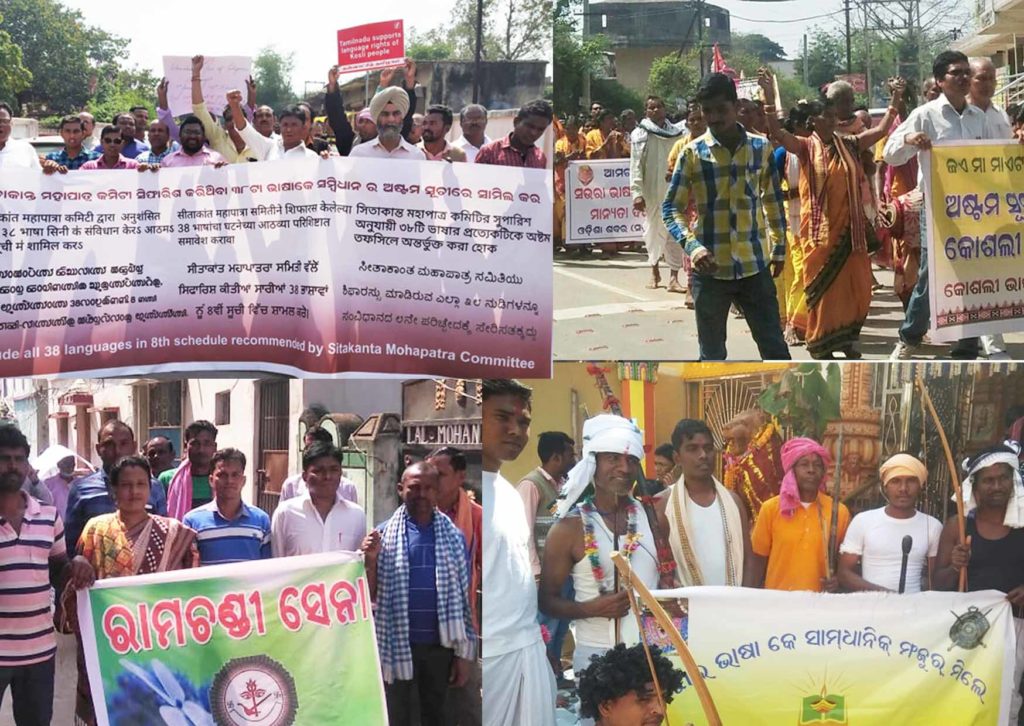Hundreds of language activists from around India today, on International Mother Language Day, rallied at Bargarh organised by Kosali Kriyanusthan Committe and took out a march from Samlei Temple to Biju Patnaik Town Hall with slogan demanding the constitutional rights of Kosali and other unrecognised languages.
In the meeting at Biju Patnaik Town Hall, Coordinator of the organisation Saket Sreebhushan Sahu gave the introductory speech and welcomes the guest. Then the gathering kept two minute silence for the martyrs of Pulwama. Again language workers took oath to protect and preserve mother languages. The language activists expressed their hope that Kosali and all the 38 languages pending under active consideration of the Union Government to be included in the 8thSchedule of the Constitution.
Dr. Joga Singh, Professor in Linguistics and President Campaign for Language Equality and Rights emphasized that Kosali language has as much linguistic strength as any other so called developed languages like English and Hindi. He took examples from the latest scientific terminology and showed how easily those concepts can be expressed through Kosali. He also stated that no community can make any significant progress in any field by handing over linguistic domains such as education to any language other than mother tongue. He stressed that the use of a language other than mother tongue in education, administration, etc. creates appalling social exclusions which can have serious social and political consequences. He called upon Indian people to come forward and reverse the anti-Indian languages policies and practices of Indian governments. He said that the fighting for Indian mother tongues is fighting for India’s future. He lauded the efforts of Kosali Kriyanushthan Committee and its Coordinator Saket Sahu. He assured all kind of support for recognition of Kosali as the first language of Kosal region and its inclusion in the 8th schedule of the constitution.
Aazhi Senthilnathan, Federal Coordinator CLEAR and National Coordinator, Thannatchi Thamizhagam, Tamil Nadu says, Odia goverment should seriously consider the demand. Let me refer an historical event that too happened in this same place 120 years ago. During the colonial period, when the modern Odisha was amalgamated in various provinces like Central Province in the west, Bengal Province in the North and Madras Province in the south, Hindi, Bengali and Telugu were imposed on the Odia people. In 1895, Sambalpur saw agitation against the imposition of Hindi. Thus the Odia speaking people knew the importance of language rights. Now, ironically, in the same region of Odisha, we see the Kosali movement today. Now it is the duty of Odia govermnent and Union government to recognize Kosali.
Another participant Siddhabrata Das, Senior Memeber Bangla Pokkho says, “We must learn from history. Language imperialism has never strengthened a state. I cannot study in my mother tongue, I cannot work in my mother tongue , I cannot get service in my mother tongue then is it my nation ? Who has given the government right to turn me into a second class citizen in own nation? So I demand that government accepts Sitakanta Mahapatra committee recommendations and include Kosali along with all other unrecognized language in the 8th Schedule of the Constitution.”
Author and activist of Angika language, Kundan Amitabh added, the Angika language which is mother language of 6 crore people of 26 districts of Bihar, Jharkhand, West Bengal must be included in the eighth schedule of Constitution as early as possible. Also, all 38 languages recommended by the Sitakanta Mohapatra Committee be included in the Eighth Schedule of the Constitution.
As long as there is no freedom of getting education and employment in mother tongue, it is impossible to achieve the right purpose of the country’s independence.
To save Indian culture, we should endeavour to save all the Indian languages by providing equal opportunities. The language of any country is invaluable resource because it takes thousands and millions of years for any language to be formed and which is also the conductors of different cultures and traditions.
It is very sad that due to political dominance, some languages have found place in the eighth schedule by describing the language of the adjacent largest land as their dialect. For example, Maithili the language of only few thousand people in Bihar’s 2 districts has encroach the land of Angika – the language of millions of people in 26 districts of Bihar, Jharkhand and Bengal. This is causing the destruction of Angdesh culture by declaring the region of Angika as its own. In the same way Odia language has been doing it with Kosali language.

